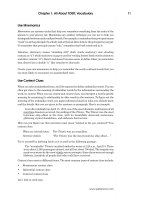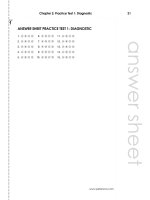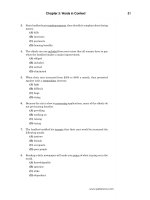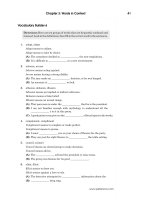Tài liệu Master toefl vocabulary part 3 docx
Bạn đang xem bản rút gọn của tài liệu. Xem và tải ngay bản đầy đủ của tài liệu tại đây (86.22 KB, 10 trang )
○○○○○○○○○○○○○○○○○○○○○○○○○○○○○○○○○○○○○○○○○○○○○○○○○○○○○○○○○○○○○○○
○○○○○○○○○○○○○○○○○○○○○○○○○○○○○○○○○○○○○○○○○○○○○○○○○○○○○○○○○○○○○○○○○○○○○○○○○○○○○○○○○○○○○○○○○○○○○
Chapter 1: All About TOEFL Vocabulary 11
www.petersons.com
Use Mnemonics
Mnemonics are memory tricks that help you remember everything from the order of the
planets to your grocery list. Mnemonics are another technique you can use to help you
distinguish between easily confused words. For example, to remember that principal means
“main” (as in the principal of a school), look at the last three letters: the principal is your pal.
To remember that principle means “rule,” remember that both words end in le.
Likewise, stationary means “standing still” (both words stationary and standing
contain an “a”) while stationery is paper used for writing letters (both words stationery
and letter contain “er”). Desert and dessert become easier to define when you remember
that dessert has a double “s,” like strawberry shortcake.
Create your own mnemonics to help you remember the easily confused words that you
are most likely to encounter on standardized tests.
Use Context Clues
When you take standardized tests, you’ll be expected to define unfamiliar words. You can
often get clues to the meaning of unfamiliar words by the information surrounding the
word, its context. When you use context and context clues, you interpret a word’s specific
meaning by examining its relationship to other words in the sentence. To figure out the
meaning of the unfamiliar word, you make inferences based on what you already know
and the details that you are given in the sentence or paragraph. Here’s an example:
Just after midnight on April 15, 1912, one of the most dramatic and famous of all
maritime disasters occurred, the sinking of the Titanic. The Titanic was the most
luxurious ship afloat at the time, with its beautifully decorated staterooms,
glittering crystal chandeliers, and elaborate food service.
How can you figure out that maritime must mean “related to the sea, nautical”? Use
context clues:
What you already know The Titanic was an oceanliner.
Sentence details “The Titanic was the most luxurious ship afloat. . .”
Try it yourself by defining futile as it is used in the following passage:
The “unsinkable” Titanic vanished under the water at 2:20 a.m., April 15. There
were about 2,200 passengers aboard, and all but about 700 died. The tragedy was
made even worse by the crew’s futile rescue attempts. Since there were not enough
lifeboats, hundreds of people died who could have survived.
Context clues come in different forms. The most common types of context clues include:
•
Restatement context clues
•
Inferential context clues
•
Contrast context clues
Let’s look at each type.
01_TOEFL Vocab,Ch1,1-18 8/4/06, 12:2811
12 PART I: TOEFL Vocabulary Basics
○○○○○○○○○○○○○○○○○○○○○○○○○○○○○○○○○○○○○○○○○○○○○○○○○○○○○○○○○○○○○○○
○○○○○○○○○○○○○○○○○○○○○○○○○○○○○○○○○○○○○○○○○○○○○○○○○○○○○○○○○○○○○○○○○○○○○○○○○○○○○○○○○○○○○○○○○○○○○
www.petersons.com
Restatement Context Clues
Here’s how one writer defined the word levee right in the passage:
The Army Corps of Engineers distributed 26 million plastic bags throughout the
region. Volunteers filled each bag with 35 pounds of sand and then stacked them
to create levees, makeshift barriers against the floodwaters.
Right after the word levee, readers get the definition: “makeshift barriers against the
floodwaters.”
You can also use an entire passage to get a general sense of difficult words. For example,
define epidemic as it is used in the following sentence: “Nearly 40 million Americans are
overweight; obesity has become an epidemic.” Since the sentence describes the epidemic
as affecting “40 million people,” odds are good that epidemic means “something that
happens to a large group of people.” Sometimes you won’t be able to pinpoint the precise
meaning. Here, for instance, you might infer that an epidemic indicates a widespread
threat, but you might miss the subtle connection between epidemic and disease.
Nonetheless, this clue might be just enough to help you define a new word that you
encounter on a standardized test.
Each of the following sentences contains a restatement context clue. The unfamiliar
word is in italics and the definition is in parentheses. As you read, cover the answer in
parentheses and see if you can figure it out.
1. Fatty deposits on artery walls combine with calcium compounds to cause
arteriosclerosis, hardening of the arteries.
Arteriosclerosis means (“hardening of the arteries”)
2. The upper part of the heart on the left side, the left atrium, receives blood
returning from circulation.
Atrium means (“the upper part of the heart”)
3. In many Native American tribes, the shaman, or medicine man, acted as a
ceremonial priest.
Shaman means (“medicine man”)
4. I believe that life is short, so we should enjoy what we eat. As a result, I consume
mass quantities of confectioneries, candies, and keep my dentist on retainer.
Confectioneries means (“candies”)
5. She jumped into the fray and enjoyed every minute of the fight.
Fray means (“fight”)
6. As with all electric currents or discharges, lightning will follow the path of least
resistance. This means that it will take the route that is easiest for it to travel on.
Current means (“discharges”)
the path of least resistance means (“the route that is easiest for it to
travel on”)
01_TOEFL Vocab,Ch1,1-18 8/4/06, 12:2812
○○○○○○○○○○○○○○○○○○○○○○○○○○○○○○○○○○○○○○○○○○○○○○○○○○○○○○○○○○○○○○○
○○○○○○○○○○○○○○○○○○○○○○○○○○○○○○○○○○○○○○○○○○○○○○○○○○○○○○○○○○○○○○○○○○○○○○○○○○○○○○○○○○○○○○○○○○○○○
Chapter 1: All About TOEFL Vocabulary 13
www.petersons.com
7. Many settlers on the vast American plains in the late nineteenth century used
sod, or earth, as a building material for their houses.
Sod means (“earth”)
8. Then, arrange a handful of mulch, dead leaves, on the top of the soil.
Mulch means (“dead leaves”)
9. Born in 1831, John Styth Pemberton was a pharmacist, someone who dispenses
medical drugs, who moved to Atlanta, Georgia, in 1869.
Pharmacist means (“someone who dispenses medical drugs”)
10. To make a living, he created so-called patent medicines, homemade medicines
that were sold without a prescription.
Patent medicines means (“homemade medicines that were sold without
a prescription”)
Inferential Context Clues
As you have just read, sometimes the unfamiliar word may be defined right in the text.
Other times, however, you will have to infer the meaning from what you already know
and from details you heard or read. This takes a bit of detective work.
When you make an inference, you combine what you already know with spoken or
textual clues to discover the unstated information. You may have heard this referred to
as “reading between the lines” or “putting two and two together.” In graphical form, the
process of making an inference looks like this:
Text Clues + What I Know = Inference
Try the following example:
In 1862, in order to support the Civil War effort, Congress enacted the nation’s
first income tax law. It was a forerunner of our modern income tax in that it was
based on the principles of graduated, or progressive, taxation and of withholding
income at the source.
Context Clue + What I Know = Inference
was a forerunner + fore means “before” = forerunner means
or “precede” “before”
Contrast Context Clues
You can also figure out an unknown word when an opposite or contrast is presented.
When you do this, you’re making an inference. For example, you can define literal by
finding its contrast in the sentence:
It is hard to use literal language when talking about nature because people tend
to talk about nature using figurative language.
01_TOEFL Vocab,Ch1,1-18 8/4/06, 12:2813
14 PART I: TOEFL Vocabulary Basics
○○○○○○○○○○○○○○○○○○○○○○○○○○○○○○○○○○○○○○○○○○○○○○○○○○○○○○○○○○○○○○○
○○○○○○○○○○○○○○○○○○○○○○○○○○○○○○○○○○○○○○○○○○○○○○○○○○○○○○○○○○○○○○○○○○○○○○○○○○○○○○○○○○○○○○○○○○○○○
www.petersons.com
Literal language must be the opposite of “figurative language”. If you know that
figurative language is words and expressions not meant to be taken at face value, you
can infer that “literal” must mean the strict or exact meaning. Other synonyms would
include verbatim or word-for-word.
Use contrast clues to infer the meaning of menace in the following sentence:
I was afraid that my latest mother-in-law would be a menace to our already
cranky family, but she turned out to be a great peacemaker.
Menace means “threat.” You can infer this from the contrast between “menace” and
“peacemaker.”
The following words express contrast. Watch for them as you read passages on
standardized tests.
Expressions That Show Contrast
but conversely however in contrast
on the other hand still nevertheless yet
Using context is an important way to define unfamiliar words on the TOEFL. Use all
the different types of context clues as you decode these unfamiliar words in italics.
Most natural hazards can be detected before their threat matures. But seisms
(from the Greek seismos, earthquake) have no known precursors, so they come
without warning, like the vengeance of an ancient warrior. For this reason, they
continue to kill in some areas at a level usually reserved for wars and epidemics—
11,000 people in northeastern Iran died on August 31, 1968, not in the ancient
past. Nor is the horror of the lethal earthquake completed with the heavy death
toll. The homeless still living are left to cope with fire, looting, pestilence, fear, and
the burden of rebuilding what the planet so easily shrugs away.
Word Pronunciation Definition
seisms si-zums earthquakes
precursors pre-cuhr-zurs warnings, forerunners
vengeance ven-gehnce revenge, retribution
lethal lee-thal deadly
pestilence pes-til-ence a deadly widespread disease,
like the plague
01_TOEFL Vocab,Ch1,1-18 8/4/06, 12:2814
○○○○○○○○○○○○○○○○○○○○○○○○○○○○○○○○○○○○○○○○○○○○○○○○○○○○○○○○○○○○○○○
○○○○○○○○○○○○○○○○○○○○○○○○○○○○○○○○○○○○○○○○○○○○○○○○○○○○○○○○○○○○○○○○○○○○○○○○○○○○○○○○○○○○○○○○○○○○○
Chapter 1: All About TOEFL Vocabulary 15
www.petersons.com
The film industry metamorphosed from silent films to the “talkies” in the late
1920s, after the success in 1927 of The Jazz Singer. Mickey Mouse was one of the
few “stars” who made a smooth transition from silent films to talkies with his
1928 cartoon Steamboat Willie. Within a year, hundreds of Mickey Mouse clubs
had sprung up all across the United States. By 1931, more than a million people
belonged to a Mickey Mouse club. The phenomenon was not confined to America.
In London, Madame Tussaud’s illustrious wax museum placed a wax figure of
Mickey alongside its statues of other eminent film stars. In 1933, according to
Disney Studios, Mickey received 800,000 fan letters—an average of more than
2,000 letters a day. To date, no “star” has ever received as much fan mail as
Mickey Mouse.
Word Pronunciation Definition
metamorphosed meh-tah-mor-fozd changed
transition tran-si-shun development or change
phenomenon fe-nahm-ih-nan event, occurrence
illustrious ih-lus-tree-us distinguished, celebrated
eminent eh-min-ent famous
A worldwide economic Depression in the 1930s left many people unemployed.
One such person was Charles Darrow of Philadelphia, Pennsylvania, who had lost
his job as a heating engineer. To try to make a living, Darrow invented a board
game he called “Monopoly.” Initially, Darrow tried to sell his idea to the leading
game manufacturer in America, but Parker Brothers turned the game down
because it felt the game was too elaborate to play. In desperation, Darrow used his
own money to have 5,000 games made by a small company. He sold the games
himself, and the craze spread. Seeing the success of the game, Parker Brothers
changed its mind and purchased the game for manufacturing and distribution. In
1975, twice as much Monopoly money was printed in the United States as real
money. All told, nearly 100 million Monopoly sets have been sold since 1935.
Word Pronunciation Definition
economic eek-a-nom-ik having to do with money
initially in-ih-shall-ee at first
elaborate i-lab-or-it complex
desperation des-per-a-shun extreme need
craze crayz fad, fashion
Context clues are especially crucial when you encounter words with more than one
meaning. The word favor, for example, has many different meanings. Here are six of
them: a kind act, friendly regard, being approved, a gift, to support, and to resemble.
When you read, you often come across a word that you think you know but that doesn’t
make sense in the sentence you’re reading. That’s your clue that the word has more than
one meaning. In this case, you must choose the meaning that fits the context.
01_TOEFL Vocab,Ch1,1-18 8/4/06, 12:2815









